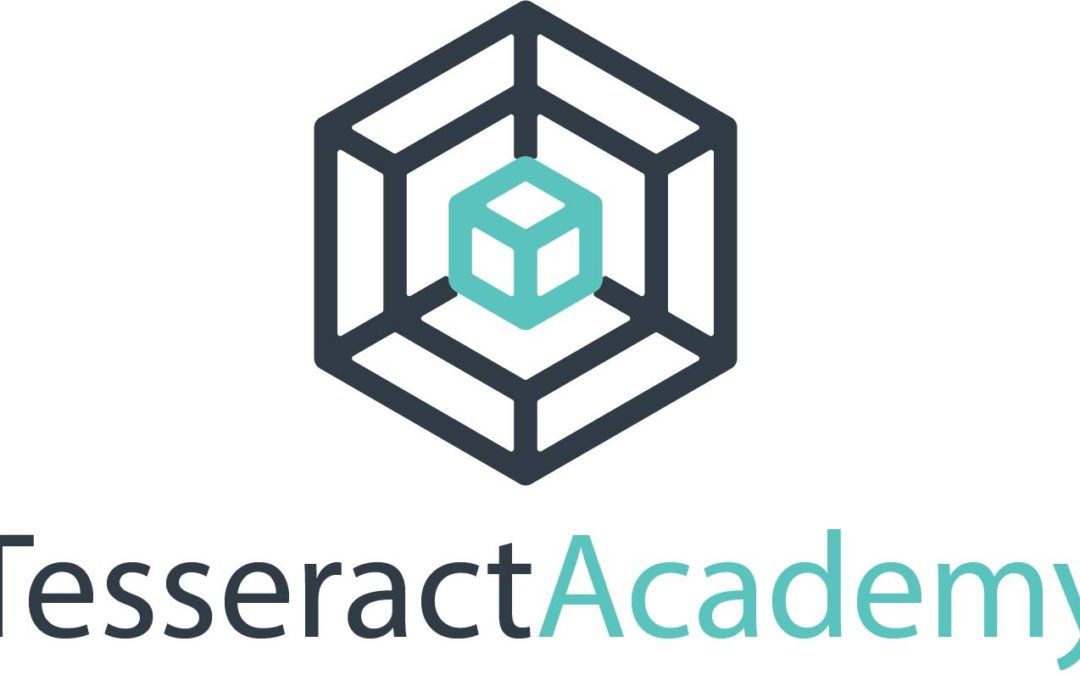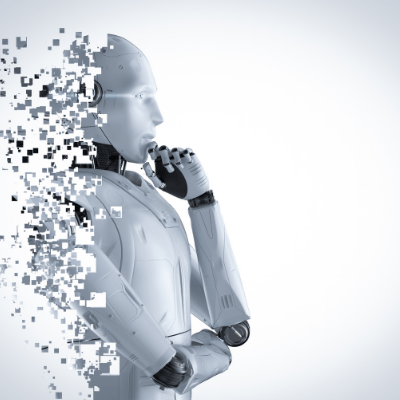AI Readiness and Organizational Culture are intertwined; a culture that embraces innovation and data-driven decision-making is essential for successful AI adoption. Companies fostering open communication, continuous learning, and adaptability are better equipped to harness the transformative power of AI. Building AI readiness starts with cultivating a culture that values experimentation, diversity of thought, and a willingness to embrace change.
This report presents the findings of a survey conducted to assess the perceived importance of AI adoption in organizations and its correlation with organizational culture. The survey aimed to gather insights into the attitudes and expectations of respondents regarding AI adoption within their organizations and industries.
We asked 35 experts on their opinions and the results were very intriguing. The profession of the respondents included: Business Developer, COO, Chief Strategy Officer,Data Engineer, Founder, Jnr Data Analyst,PHD students, Professors, Project Manager and Senior partner.
Survey Results:
Importance of AI Adoption for the Organization:
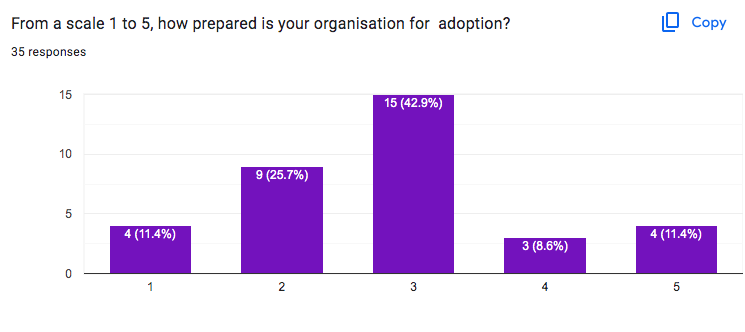
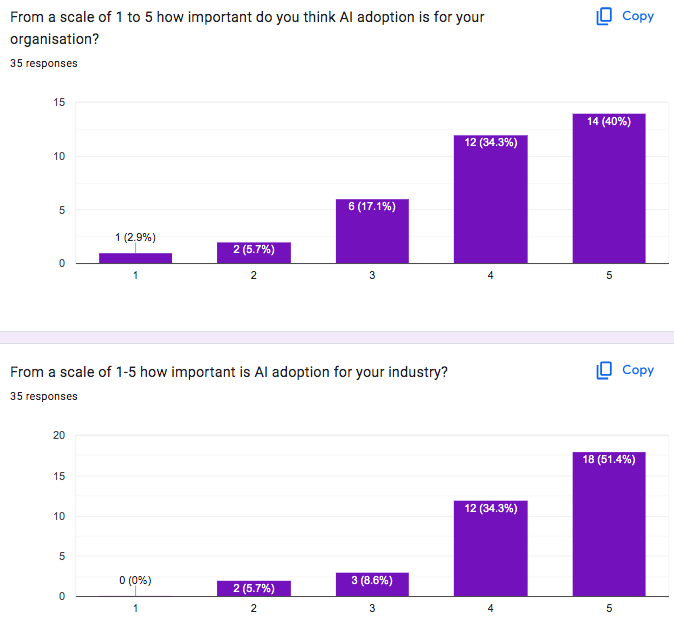
On a scale of 1 to 5, with 1 being not ready and 5 being very ready, 42% of respondents rated that their organisations readiness to adopt AI as 3. This indicates a moderate level of readiness.
However, when asked again about the importance of AI adoption for their organization, nearly 75% of respondents chose a rating of 4 or 5, demonstrating a substantial shift towards perceiving AI and data science as crucial for their organizations.
Importance of AI Adoption for the Industry:
When asked about the importance of AI adoption for their industry, over 85% of respondents chose a rating of 4 or 5. This indicates a strong belief that AI has the potential to transform their industry significantly.

When asked about the importance of AI adoption for their industry, over 85% of respondents chose a rating of 4 or 5. This indicates a strong belief that AI has the potential to transform their industry significantly.
Expectation of AI’s Impact on Roles:
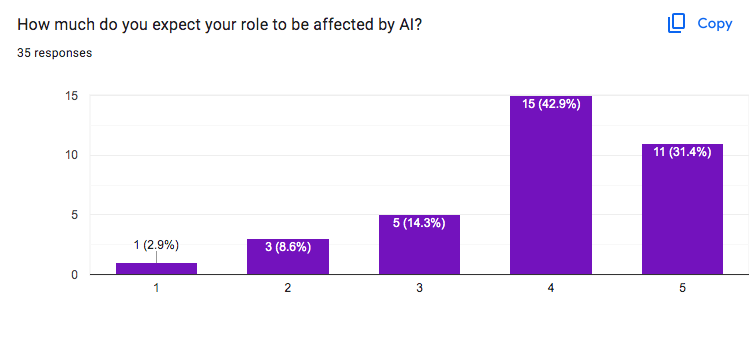
When asked how much they expect their roles to be affected by AI, over 74% of respondents chose a rating of 4 or 5, suggesting a high level of anticipation regarding the impact of AI on their job functions.
Organizational Culture and AI Adoption:
A significant majority of respondents, over 85%, highly or strongly agreed with the statement: “An organization’s culture is an important pillar for AI adoption.” This underscores the recognition of the role of culture in facilitating AI integration.
Additionally, more than 60% of respondents highly or strongly agreed with the statement: “An organization’s culture is the most important pillar for AI adoption,” while 22% remained neutral. This indicates that a substantial portion of respondents believes that culture is the paramount factor in the successful adoption of AI.
Finally the participants were asked: “What improvements in its culture do you think your organisation could make to become more AI-ready?”
Here are some of the answers the respondents gave:
“To establish a culture that respects and embraces the value and role of emerging technology (including AI), whilst preserving the right balance of, for example, balancing AI/data with professional judgment and experience.”
“Improving culture for AI readiness might involve fostering a more open mindset towards technology, encouraging learning and skill development, promoting collaboration across departments, and embracing change.”
“Continuing to mentor and encourage a younger generation of architecture student employees in the incorporation of AI in their daily workflow. Introducing the use of AI platforms in a more diverse range of daily work tasks. Discussing the long term benefits of AI in the workplace and the potential transformation these may have in the future of work.”
Conclusion
The survey results reveal a dynamic perspective on AI adoption within organizations and industries. While initial responses indicated moderate importance, a significant shift occurred when respondents considered the role of AI in their organizations and industries more deeply. Furthermore, the consensus among respondents regarding the importance of organizational culture in AI adoption highlights the pivotal role that culture plays in fostering a conducive environment for AI integration.
As organizations continue to explore AI adoption, these findings underscore the need for not only recognizing the importance of AI but also for cultivating an organizational culture that supports innovation, adaptability, and the effective use of AI technologies. This alignment of culture and technology will be critical for organizations seeking to harness the full potential of AI in the future.
How can the Tesseract Academy help you?
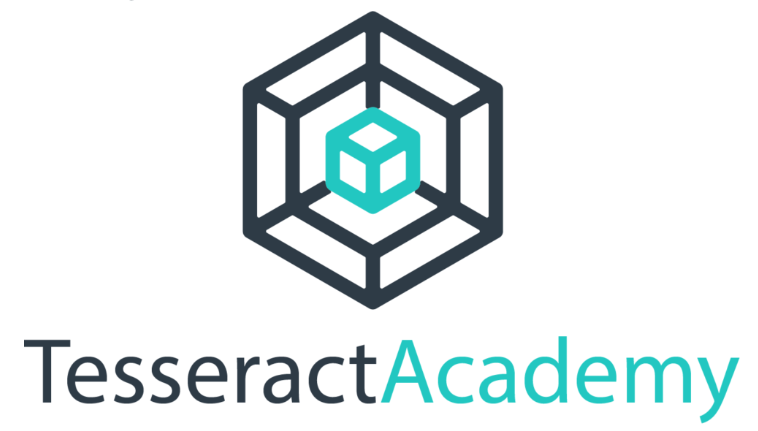
The Tesseract Academy can help senior professionals and businesses prepare for the AI-driven future by offering training and education in these emerging fields.
The Tesseract Academy‘s mission is to help the leaders of tomorrow thrive in a digital world.
- We help senior professionals and leaders become AI and Web3.0 literate through our program. Apply now!
- If you are a business owner, we can transform your business using AI within 6 weeks (otherwise we give your money back). Learn more about our AI transformation program.
Get in touch if you have any questions.

